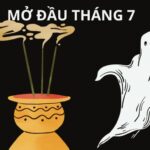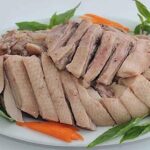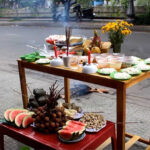The 15th and 1st days of the lunar month are considered sacred, thus offering rituals are commonly practiced. Legends also suggest that these days are sacred to Buddha. According to the lunar calendar, the first and full moon days experience significant lunar changes, which can greatly impact people, sometimes bringing bad luck. Hence, ancestors would burn incense and pray for peace and fortune.
The ancients also believed that the first and full moon nights had the strongest yin energy of the month. They would burn incense, pray to their ancestors, and make offerings to wandering souls to avoid any disturbances.

The 15th-day moon worship is a moon festival, usually celebrated at night with rituals and festivities.
Typically, people perform rituals before noon or the day before the 1st and 15th days. They believe that performing rituals at night during these days is too late and considered disrespectful, akin to inviting ancestors for a meal and serving it very late. Moreover, people fear wandering souls on these nights, and burning incense at night may invite them into their homes.
Why is the 15th-night moon worship usually performed at night?
The 15th-night moon of the 8th month is unique compared to other full moon nights of the year. The moon is at its brightest and roundest during this month. This night is also known as the Mid-Autumn Festival, a traditional moon worship festival and a reunion for families. Many families perform rituals after dinner to reunite and celebrate together. Moreover, as it is a moon festival, it is only fitting to perform the rituals at night when the moon is visible. During the day, the sun’s rays overpower the moon, making it impractical to worship the moon.

A common sight during the 15th-night moon worship
After the rituals, it is customary for families and guests to gather in the yard, sip tea, and admire the moon. The ancients considered moon gazing a delightful pastime. They believed that the bright moonlight held special powers, bringing good fortune and even enhancing one’s complexion. The moonlight was also thought to foretell the coming year’s harvest. Thus, the 15th-night moon worship is a moon festival that necessitates evening rituals.
Under the bright moonlight, people also take to the streets, carrying lanterns, watching lion dances, and releasing floating lanterns.
The 15th-night moon is also when families set up outdoor altars, offering mooncakes, autumn fruits, tea, and wine to the moon.
*Reference for further exploration
Moon: Banish Negative Energy with This Morning Ritual’>The Ultimate Guide to a Fortunate New Moon: Banish Negative Energy with This Morning Ritual
The Ultimate Guide to Ghost Festival: Timing and Rituals for a Peaceful Offering
The seventh lunar month is often regarded as the “Hungry Ghost Month,” a time believed to bring misfortune. Superstitions aside, it is a month where many honor their ancestors and pay respect through offerings and rituals. It is a time-honored tradition, and many take great care in preparing and observing these rituals.






































